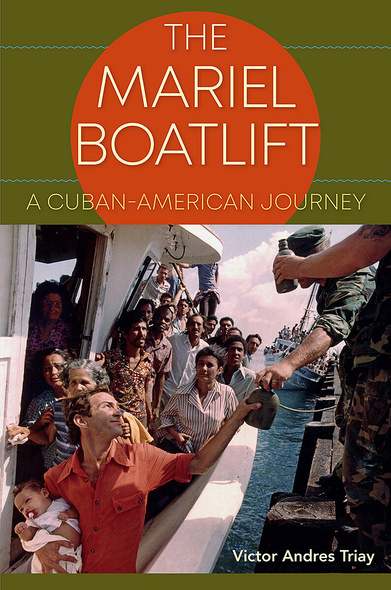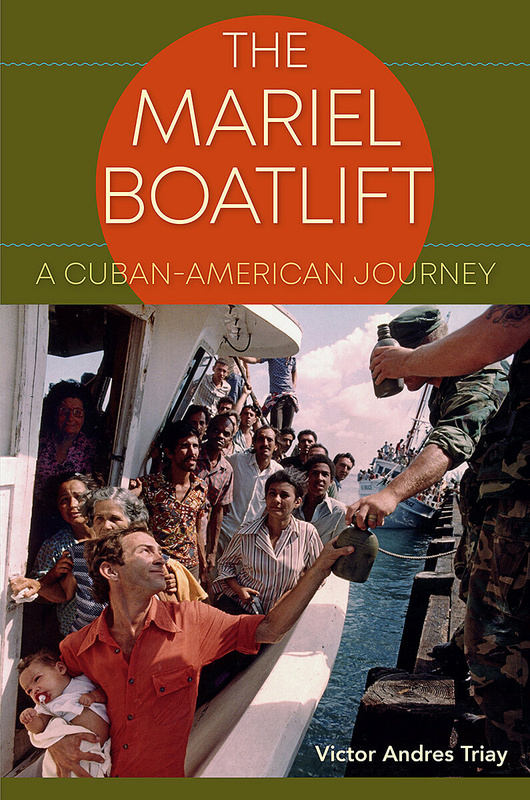Our shopping cart is currently down. To place an order, please contact our distributor, UTP Distribution, directly at utpbooks@utpress.utoronto.ca.

American Association for State and Local History Leadership in History Award in Local History - Honorable Mention
Florida Book Awards, Gold Medal for Florida Nonfiction
Set against the sweeping backdrop of one of the most dramatic refugee crises of the twentieth century, The Mariel Boatlift presents the stories of Cuban immigrants to the United States who overcame frightening circumstances to build new lives for themselves and flourish in their adopted country.
Award-winning historian Victor Triay portrays the repressive climate in Cuba as the democratic promises of Fidel Castro’s 1959 revolution gave way to a communist dictatorship under which the people of the island became virtually cut off from the outside world. He illustrates how escalating internal tensions during the regime’s second decade in power culminated in an exodus of over 125,000 Cuban refugees across the Straits of Florida during the spring and summer of 1980.
Alongside a fast-paced narrative offering a brief history of the Mariel Boatlift, Triay presents testimonies from former Mariel refugees who recall their lives in Cuba before the boatlift and how they longed to reunite with family members who lived in exile in the United States. Their captivating stories detail the physical and psychological abuse they endured in Cuba at the hands of pro-government mobs and the mistreatment many experienced at processing centers there before reaching the port of Mariel. They recall treacherous journeys to Key West aboard vessels that were deliberately overcrowded to life-threatening levels by Cuban authorities, as well as their experiences settling in Miami and beyond.
Called the scum—escoria—of society by the Cuban government, a false portrayal accepted and spread by some in the American media, Mariel refugees faced extraordinary challenges upon entering U.S. society. Yet, despite the obstacles placed before them, the overwhelming majority of these immigrants successfully transitioned to their new lives as Americans and many have emerged as leading professionals, scholars, writers, artists, and businesspeople. This book shares their hardships and successes while profoundly illustrating the human impact of international power struggles.
“In this informative and moving work, historian Triay (Fleeing Castro) expertly explores one of the most infamous refugee crises in U.S. history, the 1980 Mariel boatlift, in which roughly 125,000 Cuban refugees left the country for America after an economic downturn. Each chapter first covers a particular event leading up to the exodus and then offers interviews with refugees, volunteers, and leaders. Through discussion of those events—the early freedom flights of the 1960s; the Peruvian Embassy crisis, when thousands of Cuban citizens sought shelter in the Peruvian embassy in Havana; Castro’s decision to allow more than 1% of Cuba’s population to flee in the Mariel boatlift in order to ‘release the pressure of unemployment and a bad economy’—readers get a vivid picture of the horrible conditions those choosing to leave Cuba endured: government-organized mob violence, time in filthy refugee camps waiting to be allowed to depart, and death-defying ocean journeys on overloaded ships through stormy weather. Triay argues that while Castro attempted to ensure those leaving were social ‘undesirables’ (particularly people with criminal convictions and mental illness) and to propagandize against them, for the most part the ‘marielitos’ were law-abiding male minors and working families. This compassionate and accessible study is especially relevant given current debates surrounding immigration.”—Publishers Weekly
With the rigor of an accomplished historian and the grace of a superb storyteller, Victor Andres Triay uses his voice and the voices of a score of protagonists to brilliantly capture the facts and the emotions of the 1980 Mariel Boatlift and its impact. A must-read for those interested in the past and future of U.S.-Cuba relations.’—José Azel, author of Mañana in Cuba: The Legacy of Castroism and Transitional Challenges for Cuba ‘A timely reminder of the human costs associated with states using migrations to advance political aims.’—Gaston A. Fernandez, coauthor of Democracy as a Way of Life in America: A History
Victor Andres Triay is professor of history at Middlesex Community College in Middletown, Connecticut. He is the author of several books, including Bay of Pigs: An Oral History of Brigade 2506.
Contents Preface xi Introduction 1 1 The Road to Mariel 18 2 The Odyssey Begins 47 3 Herded into the Abreu Fontán and the “Mosquito” 95 4 A Perilous Voyage at Sea and Arrival in Key West 115 5 Reception and Resettlement 142 6 In the Land of Opportunity 178 Epilogue 200 Acknowledgments 203 Notes 205 Bibliography 221 Index 227




